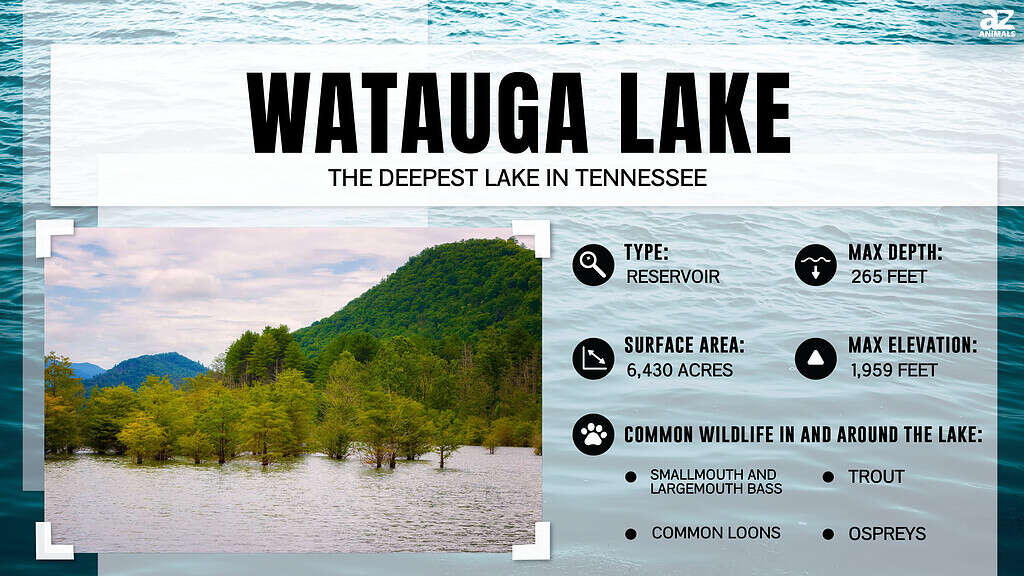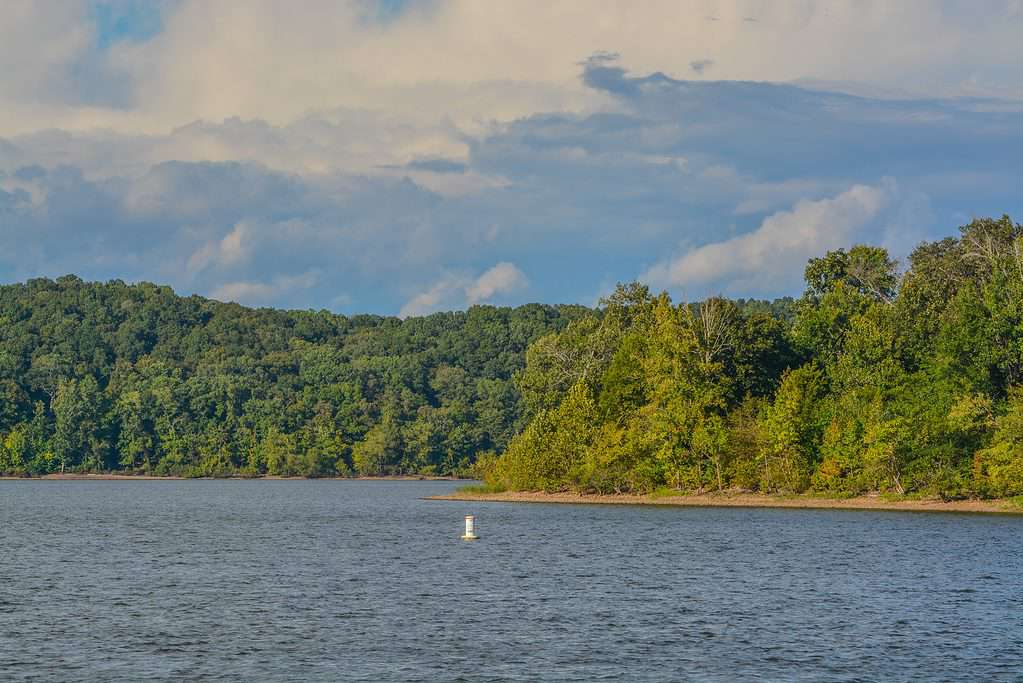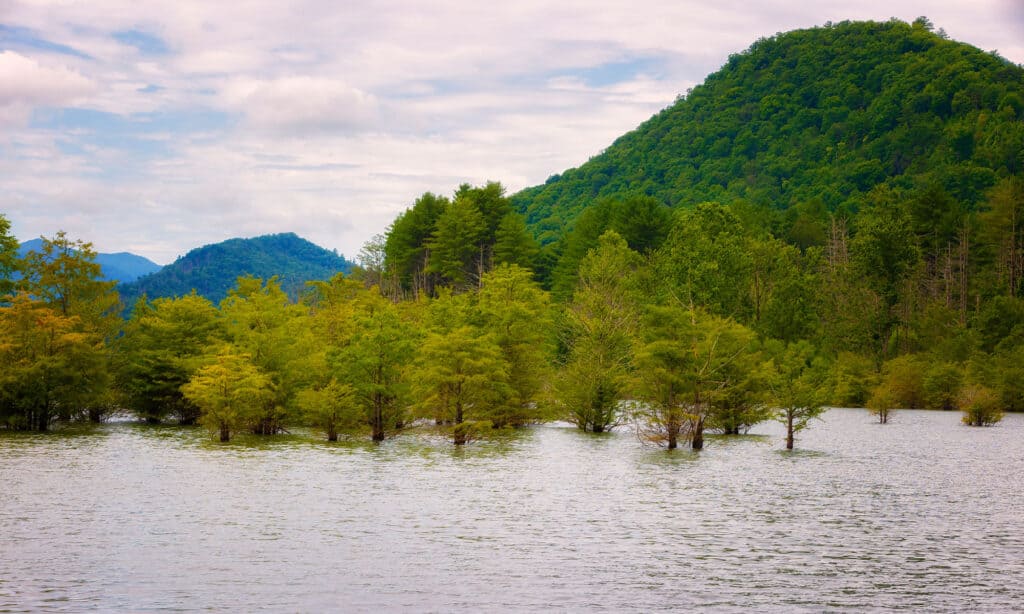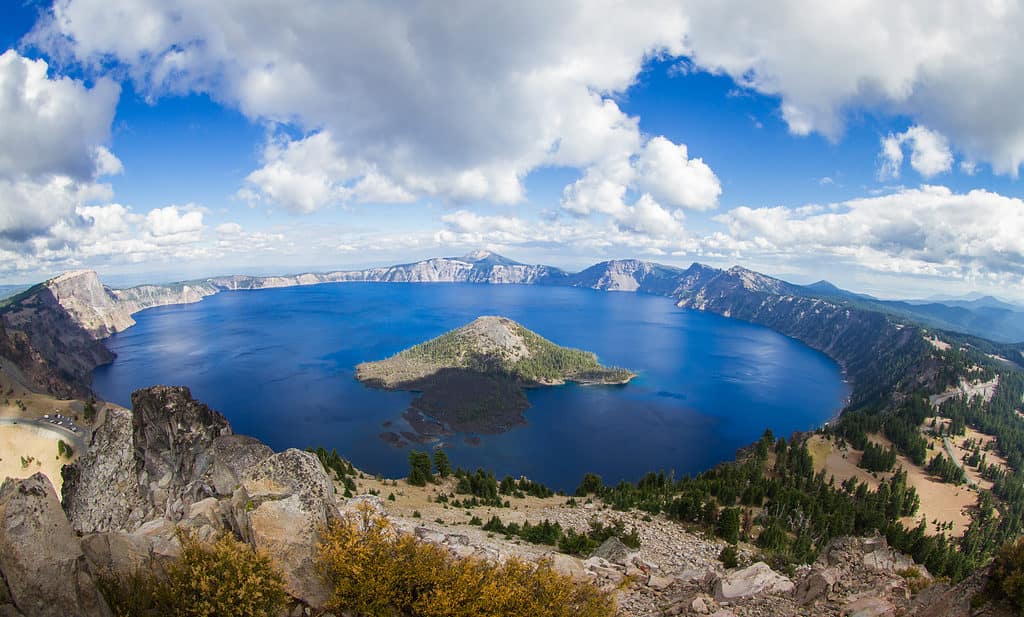Key Points:
- The deepest lake in Tennessee is Watauga Lake, a reservoir in the northeastern part of the state formed by the Watauga Dam on the Watauga River.
- The lake is 256 feet deep, has a surface area of around 10.3 square miles, and a shoreline of about 105 miles, making it one of the largest lakes in the region.
- Watauga Lake is a popular destination for fishing and is home to a variety of species, including smallmouth bass, rainbow trout, and walleye.
Tennessee has the Mississippi River as its western border, Kentucky Lake on the northern border, the Watts Bar Reservoir to the east, and the Tennessee River flowing down to Pickwick Lake in the south.
If you live in Nashville you know how popular Percy Priest Lake is for boating, kayaking, swimming, and fishing (really excellent fishing!).
When it comes to the deepest lake, the biggest lakes are often also the deepest, but what about Tennessee? What lake is the deepest lake and how deep is it?
Is there anything buried in the deepest lake in Tennessee?
Let’s find out all about the deepest lake in Tennessee!

Is the Biggest Lake in Tennessee the Deepest?

Kentucky Lake, in Kentucky and Tennessee, is the biggest lake with a presence in Tennessee but it’s not the deepest.
©Norm Lane/Shutterstock.com
No. The biggest lake in Tennessee is Kentucky Lake, which is on the northern border of Tennessee with Kentucky. This massive lake is in both states and covers 160,309 acres (648.7 km2). While it is the biggest lake in Tennessee it is not the deepest lake.
Kentucky Lake’s deepest point is on the Kentucky side, at the Rock Quarry, which is a popular swimming hole where the depth is a little over 100 feet. The deepest part of Kentucky Lake in Tennessee is 75 feet deep.
What Is the Deepest Lake in Tennessee?
The deepest lake in Tennessee is Watauga Lake. Compared to Kentucky Lake, Watauga is not nearly as big, Watauga is 6,400 acres. This picturesque lake is nestled along the Cherokee National Forest and the Appalachian Mountains.
The forest side of the lake is mostly undeveloped providing miles of natural beauty. The Appalachian Trail actually crosses the western tip of the lake.
How Deep Is the Deepest Lake in Tennessee?
The deepest lake in Tennessee is 256 feet deep. Watauga Lake is a man-made reservoir created by the damming of the Watauga River. The project to build the dam was put on hold during World War II but restarted in 1946 and wrapped up at the end of 1948. The dam was created for the purpose of food control and hydroelectric power.
The Wilbur Dam is just three miles downstream and forms Wilbur Lake. If you want to paddle board or kayak, Wilbur Lake is the place to go for a peaceful time on the lake.
Where Is Watauga Lake Located on a Map?
Watauga Lake covers areas of Johnson and Carter counties. It is in northeast Tennessee near the North Carolina border and located east of Elizabethton.
Is Watauga Lake a Recreational Lake?
Yes! Watauga Lake is a recreational lake but due to the fact that it is in a more rural area of Tennessee, you might not run into huge crowds. There are several boat ramps and campgrounds along the shoreline. Shook Branch Beach is a great place for swimming which is located at the western end of the lake.
Want a bit of an adventure? Load up your tandem kayak with a picnic lunch and paddle out to Clifford Island. This small island off the Watauga Point Recreation Area is a secluded place for a peaceful picnic.
Animals That Live in Watauga Lake

Smallmouth and largemouth bass, rainbow and brown trout, and walleye can be found in Watauga Lake.
©iStock.com/Dee
Watauga Lake is home to a diverse array of wildlife, both in and around the water. Many fish species can be found in the lake, including smallmouth and largemouth bass, rainbow and brown trout, walleye, and crappie, among others.
These fish provide food for a number of larger aquatic predators, such as ospreys, eagles, and herons, which can often be seen hunting in and around the lake.
Other animals that live in the area include various types of turtles, snakes, and frogs, as well as mammals like beavers, raccoons, and deer. The surrounding forests are home to black bears, foxes, coyotes, and other predators, while smaller animals like chipmunks, squirrels, and rabbits can also be found.
Birdwatchers will find plenty of species to observe around the lake, including waterfowl like ducks and geese, as well as songbirds and raptors.
Some of the more unique species that can be spotted in the area include the common loon, which migrates to the lake during the winter months, and the bald eagle, which has made a comeback in recent years and can often be seen soaring above the lake’s waters.
Overall, the diverse array of animals that call Watauga Lake home makes it a fascinating destination for nature lovers and outdoor enthusiasts.
How Is the Fishing on Watauga Lake?
The fishing is excellent on this cool deep lake. Anglers come for bass, bluegill, trout, and catfish. You can fish from shore or take a boat out to search for the perfect fishing hole.
Are There Any Tennessee State Fishing Records on Watauga Lake?
Yes! The biggest lake trout ever caught in Tennessee was reeled in off Watauga Lake. A 22-pound 2-ounce lake trout was caught by Jack Forbes on July 3, 2008. Must have been an exciting 4th of July to share the news of that record catch!
The biggest Ohrid trout were also caught on Watauga Lake. In fact, the biggest Ohrid trout in Tennessee is also the biggest in the world! The world record Ohrid trout was caught by Richard Carter on March 28, 1986. His 14-pound 4-ounce trout tied the previous world record that was set just two months before on January 26, 1986. That record was set by Kim Durfee on the Platte River in Wyoming. Both records stand today!
Is There a Ghost Town at the Bottom of Watauga Lake?
Yes! The town of “Old” Butler had to relocate before the Watauga Dam project began. The Butler Museum is now in the “New” Butler where you can see photos and memorabilia of the original town that is now at the bottom of the lake. You can tour the “Stout’s General Store,” which was moved before the floods and is not part of the museum. When you walk in you will feel like you are taking a step back in time. There won’t be a self-checkout lane but you will see an antique cash register!
Are There Any Deep Lakes at Graceland Where Elvis Lived?

Graceland, the home of Elvis Presley, in Memphis, Tennessee, does not have any lakes.
©Rolf_52/Shutterstock.com
Graceland, the home of Elvis, is in Memphis, Tennessee. While there were plenty of animals on the farm at Graceland there is not a lake on the property. Elvis loved horses, and his favorite was a golden palomino quarter horse whose name was Rising Sun. He also had several dogs over the years.
Elvis did not sing “You ain’t nothin’ but a Labradoodle,” but he did sing about a hound dog! He had a pet hound dog named Sherlock, which was a basset hound. Horses and dogs seem like perfectly normal pets, but Elvis stepped outside the norm quite a bit. He had a pet chimpanzee, named Scatter and later a squirrel monkey named Bambi.
Is There a Lake Named Elvis Presley Lake?

Elvis Presley Lake is in Tulepo, Mississippi, the birthplace of Elvis Presley.
©Jordan Hill Photography/Shutterstock.com
Yes! Elvis Presley Lake is located in Tupelo, Mississippi, the birthplace of Elvis. Elvis Aaron Presley was born on January 8, 1935, in a small two-room house. Did you know Elvis was a twin? His identical twin brother, Jesse, was born first but sadly he was stillborn. In 1948, the family moved from Tupelo to Memphis.
A small lake northeast of downtown Tupelo was named after Elvis to commemorate Elvis’ birthplace. Most of the area around the lake is undeveloped. There is the Elvis Presley Lake and Campground on the east shore and the Lakelife RV Park on the Northwest edge of the lake.
The deepest spot on Elvis Presley Lake is northwest of the dam where it reaches 35 feet deep. Not nearly as deep as the deepest lake in Tennessee.
How Does the Deepest Lake in Tennessee Compare to the Deepest Lake in the U.S.?

Crater Lake in Oregon is the deepest lake in the United States.
©Wollertz/Shutterstock.com
When you compare the deepest lake in Tennessee, Watauga Lake, at 256 feet deep to the deepest lake in the U.S., you will see it is not nearly as deep. The deepest lake in the U.S. is Crater Lake in southern Oregon. Crater Lake is 1,949 feet deep! This is not a reservoir created by a dam at all. It is a completely natural lake that formed at the top of an old volcano.
The rich blue waters of Crater Lake are only from rain and snow melt. There are no rivers, streams, or waterways leading into the lake. The National Park Service works to maintain the clarity of the lake and to prevent invasive species from entering the water. You are allowed to swim in Crater Lake (brace yourself, it is quite chilly) but scuba gear, snorkel gear, and floaties are not allowed.
What Is at the Bottom of Crater Lake?
There is no ghost town at the bottom of Crater Lake. The area around Crater Lake is now a national park, but the top of the crater it sits in was never a developed area. What is at the bottom of the lake is interesting tunnels made from dead aquatic moss. The layers of the tunnels have moss that has been measured as thick as 40 yards (120 feet!).
While there are rainbow trout and kokanee salmon that live in Crater Lake you won’t find them at the bottom. 1,949 feet is too deep for fish like trout and salmon. Kokanee salmon do prefer deeper cooler waters but 15-90 feet deep is plenty deep for them.
You won’t find kokanee salmon in Watauga Lake but remember, there will be excellent bass fishing, maybe even a record breaker!
The photo featured at the top of this post is © Stephen P Robinson/Shutterstock.com
Sources
- Graceland, Available here: https://www.graceland.com/blog/posts/animal-instinct-elvis-presleys-pets
- Loyola University, Available here: https://www.luc.edu/eminent-domain/siteessays/norristn/losttownloyston/
- Mississippi Wildlife, Fisheries, and Parks, Available here: https://www.mdwfp.com/media/5445/elvis-presley-12212017.pdf
- Tennessee Wildlife Resources Agency, Available here: https://www.tn.gov/twra/fishing/where-to-fish/east-tennessee-r4/norris-reservoir.html
Thank you for reading! Have some feedback for us? Contact the AZ Animals editorial team.






